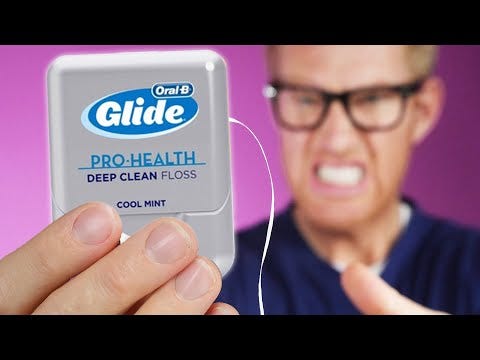This is my free weekly newsletter covering 5 interesting points from the week. Subscribe (if you haven’t already) if you’d like to get it in your inbox each week!
1. Dental Floss is poisoning you?
In a study led by The Silent Spring Institute, researchers measured 11 different PFAS chemicals in blood samples taken from 178 middle-aged women. They found that women who flossed with Oral-B Glide tended to have higher levels of perfluorohexanesulfonic acid, a type of PFAS.
PFAS are endocrine disrupting chemicals that have been linked to thyroid disease, ulcerative colitis, testicular cancer and kidney cancer.
The researchers tested 18 dental flosses for the presence of fluorine, a marker of PFAS. Three Glide products tested positive for fluorine. It was previously reported that Glide is manufactured using Teflon-like compounds. Two other store brands tested positive for fluorine.
2. Are you fat or just sun-deprived?
A 2019 study found that mice eating a high fat high sugar diet gained 33% less body fat when exposed to UV light. Further, they note that “liver-protecting triglycerdies are significantly elevated in solar UV-exposed mice” and that “exposure to our optimised solar UV regime significantly reduces atherosclerosis.”
3. Sober altered states of consciousness are common
A paper titled Altered states of consciousness are prevalent and insufficiently supported clinically a population survey was released in May 2024.
Through surveys on 3135 people in three international communities, they found that 45 percent of people have experienced an altered state of consciousness (while sober) at least once in their lives. These experiences included derealization (17%), unitive experiences (15%), ecstatic thrills (15%), vivid perceptions (11%), changes in perceived size (10%), bodily heat or electricity (9%), out-of-body experiences (8%), and perception of non-physical lights (5%).
4. The 1888 cure for ill health: 100% beef diet
Physician James H. Salisbury (inventor of the Salisbury steak) published a book titled The relation of alimentation and disease where he basically recommended an all beef diet to cure various ailments, especially digestive ones.
On page 166, he says that:
"Digestion and assimilation are very poor and consequently blood and tissue are not made fast enough to keep pay with decay and disintegration. The process of death are on the track with the agencies and efforts of life."
As for the cure for the digestive ailments that are a putting people on a path to death, he states that:
“The first step is to wash out the sour stomach and bowels, and to change the food. The food selected should be such as is least liable to ferment with alcohol and acid yeasts. This is the muscle pulp of beef, prepared as heretofore described, when it affords the maximum of nourishment with the minimum of effort to the digestive organs. Nothing else but this food, except as an occasional change to broiled mutton.” (“Nothing else” is emphasized in the original text)
5. The ketogenic diet is a medical treatment
Some of you may be aware that before the invention of anticonvulsant drugs, the ketogenic diet was the standard treatment for epilepsy as it was found to prevent seizures. It was interesting for me to learn that there are two other diseases where the ketogenic diet is the standard of care: GLUT1 deficiency and pyruvate dehydrogenase complex deficiency.
In the case of GLUT1 deficiency, glucose isn't transported properly across the blood brain barrier and into the brain.
Early diagnosis is vitally important so the [keto] diet can be initiated as soon as possible to help control symptoms and better preserve brain growth and development, and also to avoid often ineffective and potentially harmful medication trials and side effects. Experts recommend continuing the [keto] diet as long as possible, and many patients continue to experience benefits from the diet even well into adulthood. -Glut 1 Deficiency Foundation
Simply put, pyruvate dehydrogenase complex deficiency is a defect in carbohydrate metabolism. One study found that the earlier patients with this deficiency were put on a keto diet, the longer they lived and the better their mental development.










Personally, I wouldn't call derealization a mystical state. It has only ever been a response to high stress for me.
Thanks Joseph for another expert curation!! On Point #2: From what I've read, sun avoidance is 'the new smoking'! Interesting that in the study you mentioned, UV radiation was protective even against a diet combining high fat and high sugar (a combination which activates the 'Randle cycle'.) Dr. Max Gulhane can be found lecturing on YouTube about the benefits of sun exposure for heart health!
Re Point #4: Chemist and physician Dr. Salisbury was a physician during the Civil War. I wonder if he was responding in part to the activism of Sylvester Graham, a self-taught, self-appointed health influencer who recommended very bland grain-based diets to quell human sexual urges (and overall vitality, it seems), as did J. H. Kellogg, who was inspired by Graham. Regarding Point #5: I wonder if there is ANY neurological condition that keto would not help! The keto diet is being widely studied in clinical trials and It's the only diet that can be objectively measured with lab values (ketone levels).